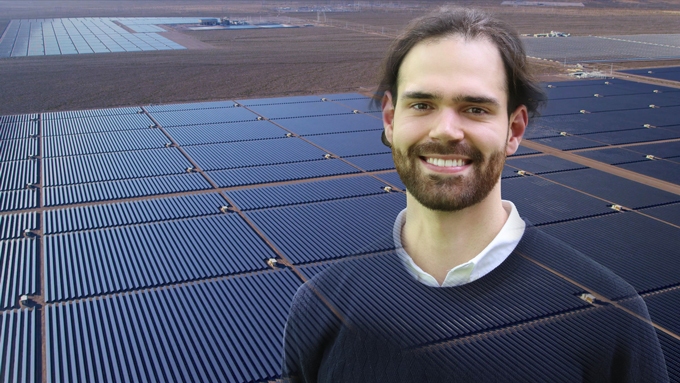Canberra is quickly becoming a global hub for renewable energy businesses, and at ANU we’re helping train the next generation.
We spoke to recent graduates with Renewable Energy Systems majors who have started their careers here in the ACT, all of whom said that ANU alumni make up a large portion of the workforces, and that the industry regularly looks to ANU for recruiting.
“At ANU, we’re really lucky to have lecturers who are cutting edge in terms of their contributions to renewable energy,” said Kurran Sidhu, whose participation in the Capstone Engineering program as an undergraduate led indirectly to his current job as a Regulatory Officer, Australian Clean Energy Regulator. “There was always a tangible connection between our work on campus and the industry.”
“The energy change that we’re seeing at the moment is happening rapidly, and it’s not enough to just teach out of the textbook,” said Associate Professor Fiona Beck. “We need to be able to put that in context and give our students a feeling of what is happening right now in the world and how they are going to be able to go out as graduates and make a positive difference.”
“The glue that seemed to hold people together in this particular major was their drive to do something good for the planet,” said Diana Tulip, who now works as an Asset Manager at Neoen Australia. “The Renewable Energy major is for big thinkers, people who like to contribute to something that’s really going to impact the world.”
“Contributing to society, helping decarbonisation, that was the drive that really helped get me through and I think that’s what you need to have in your studies,” said Louise Bardwell who was invited to join the Battery Storage and Integration Project (BSIP) prior to her graduation. “We were all just as nerdy and passionate about renewables as each other. The social side was always exciting and you can kind of buzz off each other and throw around ideas, and that’s where all the great innovation happens.”
The race to replace fossil fuels
Renewable energy refers to a suite of technologies that we use to transform power to electricity. These include solar power, wind power and geothermal power as well as solar-to-thermal energy and solar-to-hydrogen energy.
“Fossil fuels have actually been a fantastic resource for humanity,” said Dr Beck. “We have really evolved and developed to the to the point that we have because we’ve had this really energy rich fuel source that could be easily transported to power a whole host of different applications, including electricity.”

The mounting, catastrophic impacts of climate change have spurred the global scientific community, as well as governments, industry, and non-government organisations to accelerate the modernisation of our energy system to limit the production of greenhouse gasses.
“Unfortunately, there’s no one renewable resource that can [replace fossil fuels]. We need different technologies that can work together to take up all of these different applications,” Dr Beck said.
The 20th century energy system has been designed and based on the idea that the earth has large, stationary sources of power, such as oil and coal, and that some countries have energy resources while others do not. This resulted in trade between nations, defining not only the global economy, but also global and regional conflict right up to the present day.
But in a rewnewable energy powered world, the energy economy will be democratised, Dr Beck explained.
“Everyone has access to the sun to some extent, and by happy coincidence, those places that don’t have access to the sun quite often have really good wind resources. We’re going to see a fundamental shift in the way that we think about producing, trading and using energy. And what that is going to look like is still under development at the moment.”
The academics that are involved in teaching Renewable Energy at ANU are actively researching in the renewable energy space in a range of different areas. Not only has this provided readily applicable training and job opportunities for graduates and current students, it has also allowed ANU academics to correspond and collaborate with alumni who have gone on to become innovators and leaders in the field.
“It’s very useful for me because I have this fantastic network of graduate students working in a range of energy companies in Australia and beyond that I can call on to discuss my research and to get information and share ideas,” Dr Beck said.

